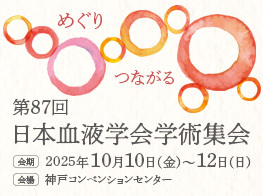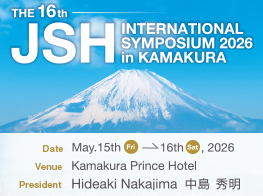
名前:一色 佑介【千葉大学医学部附属病院 血液内科】
発表形式:e-Poster
Title:
Single plasma cell transcriptome analysis in POEMS syndrome
Authors:
Yusuke Isshiki1,2, Naoya Mimura1,3, Motohiko Oshima4, Kensuke Kayamori1,4, Masahide Seki5, Yurie Nagai1, Shokichi Tsukamoto1, Yusuke Takeda1, Chikako Ohwada1,6, Sonoko Misawa7, Satoshi Kuwabara7, Yutaka Suzuki5, Emiko Sakaida1, Chiaki Nakaseko6, Atsushi Iwama4
Affiliations:
1. Department of Hematology, Chiba University Hospital, Chiba, Japan
2. Division of Hematology and Medical Oncology, Department of Medicine, Weill Cornell Medicine, New York, USA
3. Department of Transfusion Medicine and Cell Therapy, Chiba University Hospital, Chiba, Japan
4. Division of Stem Cell and Molecular Medicine, Center for Stem Cell Biology and Regenerative Medicine, The Institute of Medical Science, The University of Tokyo, Tokyo, Japan
5. Laboratory of Systems Genomics, Department of Computational Biology and Medical Sciences, Graduate School of Frontier Sciences, The University of Tokyo, Tokyo, Japan
6. Department of Hematology, International University of Health and Welfare, Narita, Japan
7. Department of Neurology, Chiba University Graduate School of Medicine, Chiba, Japan
Abstract:
Introduction: POEMS syndrome is a rare disease characterized by multiple symptoms associated with monoclonal plasma cells. Previous studies indicated that genetic and transcriptional features of plasma cells in POEMS syndrome are different from those in other plasma cell disorders such as multiple myeloma (MM) and monoclonal gammopathy of undetermined significance (MGUS); however, none of the previous studies have identified plasma cell clones in POEMS syndrome (designated as "POEMS clones"), leaving their characteristics undetermined.
Aims: In the present study, we aimed to identify POEMS clones and unveil their transcriptional signatures by single cell RNA-sequencing (scRNA-seq) of bone marrow (BM) plasma cells obtained from patients with POEMS syndrome and other plasma cell disorders.
Methods: Ten newly diagnosed or relapsed patients with POEMS syndrome, two newly diagnosed patients with MM and MGUS, respectively, and two patients with early stage B cell lymphoma without BM invasion as normal controls were enrolled in this study. CD138+ plasma cells were purified by FACS after MACS CD138 positive selection from BM aspiration samples. Single cell isolation and library preparation were performed using Fluidigm C1 followed by paired-end sequencing by Illumina HiSeq3000. MiXCR software was used for immunoglobulin repertoire analysis. Plasma cells with the same V-(D)-J and CDR3 sequences in both IGL and IGH genes were defined as “clonal” plasma cells.
Results: We identified POEMS clones in 5 out of 10 POEMS cases, which had the same IGL sequences specific to POEMS syndrome, such as IGLV1-36, 40, 44 and 47 with IGLJ3. Proportion of POEMS clones in total BM plasma cells were much smaller (median: 14.7%, range: 7.3% - 32.5%) than MM (93 and 100%) and MGUS cases (57 and 81%). Even in the patients without detectable POEMS clones in scRNA-seq analysis, IGL sequences specific to POEMS syndrome were detected by RNA-seq of bulk plasma cells at very low frequencies of around 1%, suggesting the presence of very small POEMS clones. We also identified highly conserved somatic mutation patterns in IGLV among POEMS clones. We next compared transcriptome of POEMS clones with MM or MGUS clones as well as normal controls and non-clonal plasma cells in POEMS syndrome (designated as “POEMS non-clones”). T-distributed stochastic neighbor embedding (t-SNE) revealed that POEMS clones have different expression patterns from plasma cell clones in MM and MGUS, and show expression patterns close to normal controls or POEMS non-clones. Gene set enrichment analysis revealed that ribosomal protein gene sets, which indicate active protein synthesis, are positively enriched in POEMS clones compared with MGUS clones, but negatively enriched compared with MM clones. The genes associated with the pathogenesis of MM, such as CCND1, KRAS, NRAS and MYC, were not upregulated in POEMS clones. Although VEGF is markedly upregulated in the serum of patients with POEMS syndrome, VEGF mRNA levels were not upregulated in both POEMS clones and non-clonal plasma cells in POEMS syndrome, suggesting that VEGF is produced by cells other than plasma cells.
Conclusion: We identified POEMS clones by single plasma cell RNA-seq and identified POEMS clone-specific gene expression signatures. Our findings may have a great impact to understand the pathogenesis of POEMS syndrome.
Acknowledgement: This work was supported by JSPS KAKENHI Grant Number 16H06279, 18K08338 and 19H05653 (PAGS).



